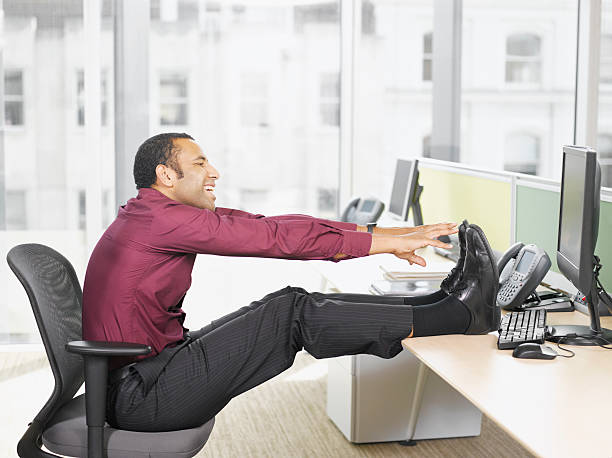Civil servants are professionals who work for the government at the local, state, or federal level. They perform a wide range of occupations, including administrative work, law enforcement, education, healthcare, transportation, and public service.
They play an important role in serving their communities and undertaking a variety of jobs, from administrative work to providing essential public services. However, their busy schedules and sedentary work environments can put them at risk for a variety of health issues, including obesity, heart disease, and diabetes.
Many civil servants are mostly sedentary workers whose jobs require little physical activity. Averagely they sit for 40 hours or more weekly. Although this is perceived as normal in the civil service, it is not healthy at all for the workers.
The human body is designed to work better when it is active, and when work deprives the body of such, it brings about deformities and issues. Studies have shown that sedentary behavior is associated with over 30 chronic diseases and conditions, including a 147% risk increase in heart disease and a 112% risk increase in type 2 diabetes.
Exercise is essential for all civil servants. Apart from minimizing your risk of several chronic diseases, it aids sleep, cognitive ability, weight control, and ability to perform work tasks.
Every civil servant that wants good health must do some exercise. Here are the top exercise tips for civil servants.
7 Vital Exercise Tips for Civil Servants

Here are the top seven exercise tips for civil servants:
1. Take breaks and walk around
One of the significant exercise tips for civil servants is to take breaks from work and walk around. Look for ways to stand up from your chair. Instead of calling a colleague on the phone, you can walk to their office.
During lunchtime, you can walk to the restaurant or café instead of ordering the food should be brought to your phone. This little walk here and there is helpful to your body.
2. Use the stairs instead of the elevators
Most civil service corporations and offices have elevator facilities to ease the stress. Instead of going with the elevators, you can use the stairs.
Using the stairs instead of the elevators is good for civil servants because it is a simple and effective way to incorporate exercise into their daily routine. Stair climbing provides cardiovascular and muscular benefits, which can help protect against diseases such as heart disease and obesity.
Furthermore, taking the stairs can improve energy levels and productivity, making civil servants more effective on the job. The number of calories that small action will burn will amaze you.
3. Go for fitness breaks
Rather than gisting or hanging around the lounge, you can do some gentle stretching, brisk walking, or hiking through the stairs.
It mustn’t be for long hours, and it can be for five or ten minutes. If your home isn’t far from the office, you can walk to the office twice or thrice a week,
The important thing here is consistency. Ensure you include it as a daily routine in the office.
4. Do some wrist stretches
It is specifically helpful for those that are always on the computer. Wrist stretches help to avoid or relieve wrist pain.
All you have to do is lift your palms, stretch or straighten your arms, press your palms together, and shake them carefully to relieve any tension.
Also, you can try out wrist curls using water bottles.
5. Do some seated leg raises
If you are older, this exercise tip will help to prevent inflammation or tension in your legs.
Posture is important here. Sit upright on your chair with your back well straightened out.
Straighten your left leg. It should be parallel to the floor and hold it firmly for 10 seconds.
Repeat these steps severally. Once you notice that you have built up strength, add some weight to the exercise by looping your briefcase or bag on your legs while doing the raises.
6. Monitor your daily steps
Using a pedometer or fitness tracker can be an invaluable tool for civil servants looking to increase their physical activity levels.
These devices can track the number of steps taken, distance traveled, and calories burned throughout the day, providing a clear picture of daily physical activity levels.
If you set goals for increasing daily steps or activity levels, it can be a motivating factor to make you add more physical activity into daily routines.
In addition, many fitness trackers allow for tracking of other metrics, such as heart rate and sleep patterns, which can provide additional insights into overall health and well-being.
7. Be consistent with exercising
Consistency in exercise routine is crucial for civil servants to improve their physical fitness and overall health. .Regular exercise, even for a few minutes a day, can provide several health benefits, including improved cardiovascular health and reduced risk of chronic diseases.
Therefore, make exercise a habit, endeavour to schedule it into your daily routine and treat it like any other important task.
Conclusion
By adhering to the above tips, civil servants can improve their physical fitness and overall well-being, leading to increased productivity and effectiveness on the job
However, these exercise tips for civil servants cannot be effective without a proper diet. Ensure you follow a good diet. When you combine these exercises with diet, you will notice an improvement in your health and office performance.
ALSO READ:
- 5 Effective Exercises For Neck And Shoulders Pain
- 5 Best Exercises To Do When Bloated
- 5 Best Exercises To Do After Eating
- 4 Easy Exercises For Building Muscles At Home
- 3 Best Exercises For Reducing Cellulite
- 5 Best Exercises To Do While Intermittent Fasting
- 4 Best Exercises For Bigger Legs At Home
- 10 Simple Exercises For Staying Fit
- 5 Important Exercise Tips For The Cold Weather
- 3 Exercises That Can Make You Taller



